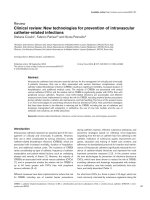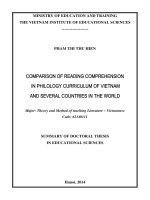Activism, academia, and new technologies the complicities of theorised and mobilised resistances in the globalising discourses of speed
Bạn đang xem bản rút gọn của tài liệu. Xem và tải ngay bản đầy đủ của tài liệu tại đây (1.04 MB, 251 trang )
BETWEEN ACTIVISM AND ACADEMIA: THE COMPLICITIES
OF ALTER-GLOBALIST RESISTANCES IN SPEED
INGRID MARIA HOOFD
(M. A. WOMENS STUDIES AND FILM STUDIES (HONS.),
UTRECHT UNIVERSITY, THE NETHERLANDS)
A DISSERTATION SUBMITTED FOR THE DEGREE OF
DOCTOR OF PHILOSOPHY
DEPARTMENT OF ENGLISH LANGUAGE AND LITERATURE
NATIONAL UNIVERSITY OF SINGAPORE
2006
ii
Acknowledgements
This dissertation is the culmination of many fruitful and instructive years spent in various
activist and academic settings. I want to thank the Department of English Language and
Literature and the University Scholars Project at the National University of Singapore for
providing me with the excellent resources to do my research and complete this
dissertation. I also want to thank the Women’s Studies Department at Utrecht University
for giving me the necessary background and enthusiasm to further pursue my research
interest abroad. I also want to thank the various activist projects and groups I participate
and have participated in over the years for all the dialogue, friendships, materials and
insights.
I extend my warmest thanks to Ryan Bishop for all his patience, suggestions, comments,
humour, and inspiration throughout the last few years. The assistance of George Landow,
Irina Aristarkhova and John William Phillips has also been invaluable. I am also grateful
for all the loving support and encouragement my friends in Europe and Singapore, as
well as my family in the Netherlands, have given me from nearby and from afar. Without
them, this dissertation would not have found its completion. And last but not least, thanks
to Sandra Khor Manickam for being my companion throughout the journey.
iii
Chapter One
Complicities of resistance: activisms in terms of material and discursive production
1.1 The stakes and paradoxes of alter-globalist resistance 1
1.2 Complicating activisms: folding back what has been projected as ‘outside’ 9
1.3 Naturalising humanism: the productive foundation of activism 16
1.4 Romanticising the margins and forging alliances 26
1.5 The technological prosthesis and the increasing reproduction of inequalities 31
1.6 Discourses of the speed-elite 37
1.7 The aporetic productivity of the practice-theory dichotomy 46
1.8 Outlining alter-globalist activist strategies that are complicit in speed 54
Chapter Two
Fantasies and tools of the speed-elite: radical new media theory and activism
2.1 Repetitions of acceleration: frantic hope, hidden despair 58
2.2 Radical new media thinkers: tactical media, autonomous zones and digital
multitudes 69
2.3 Indymedia, the permanent autonomous zone? 80
2.4 Repeating the dream of speed: academia and Indymedia activism 97
2.5 Continuing deconstruction: from technology to mobility 101
Chapter Three
Italian thought and the obsession with the migrant: the speed-elite’s daydream of radical
alterity
3.1 The rise of a metaphor: radical thought and the migrant 106
3.2 Hypermodernism, the speed elite, and its narrative of redemption 115
3.3 Complicities of radical Italian thought: imagining an ‘ally par excellence’ 123
3.4 Empire and the self-serving rhetoric of the ‘subversive’ poor migrant 133
3.5 No-border theories, Italian thought, and new media activist rhetorics 141
iv
3.6 Radical Italian thought and European and Australian no-border activism 148
3.7 Productive migrations across the borders of nation and of other institutions 154
Chapter Four
Dichotomies and spaces of the speed-elite: activism, academia, and the carrying forward
of justice
4.1 The plot thickens: the quest for justice and its complicities in speed 159
4.2 The cry for activism: the etymology of a concept 166
4.3 The dispersed university: academia’s contingent borders 173
4.4 Concepts and borderlands, or how to loyally betray one’s productive
foundations 178
4.5 Being on the border: the cry for activism within activist-research 186
4.6 Caught in the productive action-thought aporia 200
4.7 The necessity and complicity of justice and thought 208
Chapter Five
The speed elite and beyond: empowering ourselves to death? 213
Bibliography 231
v
Summary
This dissertation examines the ways in which several alter-globalist activist groups and
thinkers, as well as left-wing academic theorists, mobilise discourses and divisions in an
attempt to overcome gendered, raced and classed oppressions worldwide. In particular,
this dissertation will draw out how these mobilisations and theorisations, despite (or
because of) their liberatory claims, are actually implicated in the intensification of global
hierarchies by repeatedly invoking narratives of transcendence, connection, progress and
speed. Drawing from the quests for justice and truth that inspire current new media
activism, radical Italian thought, and the concept of academia, this dissertation will argue
that the humanist aporia that underlies all these practices, is what paradoxically also
triggers the increasing disenfranchisement along lines of gender, class and race
worldwide. Moreover, validating itself through the productive borderlines of academia
and activism, this dissertation acknowledges that it is itself similarly implicated in these
discourses and its concurrent reproduction of speed.
Chapter One will outline the relevant theories of technologies (of the subject) and
their entanglements with the contemporary globalisation of neo-liberalism and humanism.
The chapter will propose to analyse connection of technologies and discourses of
liberation and empowerment with neo-liberal capitalism through the notion of complicity,
as well as through the idea of the aporia underlying the humanist utopia of liberation.
Following this argument, the chapter will argue that these complicities facilitate foremost
the emergence of a new global elite – the ‘speed-elite’. Next, Chapter Two will analyse
the complicities of new media activism in the discourses and tools that underpin
technocratic globalisation and this new ‘speed-elite’. In particular, the chapter will look at
how the contradictions that underpin new media activism paradoxically lead to an
increasingly problematic call for empowerment through virtualisation. Chapter Three will
follow up on this analysis by critically examining the appearance of the migrant metaphor
in radical Italian thought and activism. The chapter will point out that the rise of this
metaphor is an effect of the desires of the ‘speed-elite’ to universalise humanism, cross
borders and attain transcendence. The fantasy that such desires would be liberatory for
‘the oppressed’ erases the urgent analysis of the conditions of possibility that facilitate
the ‘speed-elite’. Subsequently, Chapter Four will take the previous analyses to another
plane by pointing out that the production of this dissertation itself is complicit in the very
same discourses of speed. This is because it seeks to productively cross the borders of
activism and academia as well as thought and action, arguing problematically that such a
hybrid position is a location that speaks justice and truth. However, as with the analyses
of activism, the play of the thought-action binary will be shown to be precisely the
fundamental aporia that underlies the quest for speed as well as justice. Finally, Chapter
Five will draw together the conclusions of the previous chapters and set out to question
the stakes and consequences that these findings call forth.
1
Chapter One: Complicities of resistance: activisms in terms of material and
discursive production
“Let’s make things better.”
Philips Electronics global brand campaign slogan. (2000)
“Let us globalise the Struggle.”
Slogan at the D14 anti-European Union protests. (2001)
“Everyone resists, from gays and lesbians to rightist
survivalists so why not make the logical conclusion that
this discourse of resistance is the norm today ?”
Slavoj Žižek, “A Symptom—of What?” (494, 2003)
“The general ideology of global development is racist paternalism;
its general economics capital-intensive investment;
its broad politics the subaltern as the rhetoric of their protest.”
Gayatri Chakravorty Spivak, A Critique of Postcolonial Reason. (373, 1999)
1.1 The stakes and paradoxes of alter-globalist resistance
Let me, in order to plunge headlong into the complexity of the issues at stake, start this
dissertation at one of those memorable protests against globalisation my feminist and
anarchist friends and I participated in, which took place in Brussels on December 14,
2001. The targets of these D14 protests, which were attended by as many as 70000
people that day, were the latest decisions of the European Union and its capitulation to
2
the demands of global capital. The European Union’s increasingly neo-liberal capitalist
policies were condemned by the protesters for aggravating the gender, race and class gaps
both within Europe and worldwide. We argued that these new policies would lead to an
increasing feminisation of poverty and to the exclusion of ever more people from access
to education, transport and (new) technologies. We understood policymaking within the
European Union itself as an elitist practice, equal to those of corporate finance policies of
exploitation, and only in favour of those people who were already rich, male, white and
comfortable. Since we felt that the corporate media were not to be trusted for very much
the same reasons, an ad-hoc Independent Media Centre and website were set up in an old
deserted cinema building in the centre of Brussels, in order to enable the protesters to
make public the ‘truth’ about the alter-globalist and liberatory ideas and intentions of the
D14. Furthermore, word of the protests was supposed to spread this way, creating and
enforcing alliances around the globe between us protesters and all oppressed peoples
under the spread of neo-liberal capitalist globalisation.
A few months later, in February 2002, some of my feminist colleagues and I were
attending a European Union meeting on education and new technologies. I attended in the
capacity of my post as a New Media Project Coordinator at a Women’s Studies
department of a Dutch university, which had hired me partly because of my knowledge of
and ties to new media and feminist activist groups ‘outside’ the university. The questions
addressed at the particular meeting were varied: how to bridge the gender, race, and class
disparities within Europe; how to create access to education and new technologies
through, for instance, online learning programmes for those who are disabled or who
have no money to travel abroad to get a degree, and how to enable and increase physical
3
student mobility and lifelong learning so that people get more opportunities to empower
themselves through knowledge-gathering. Most of the organisers of the meeting were
women, and large sums of money were allocated during the meeting to tackle the issues
discussed – all off which hopefully would create equal wealth and opportunity for all
within Europe, as well as in the long run for all worldwide.
The logic of this fight between protesters and policy makers was repeated several
months later in a public debate organised by a student activist group in my home
university. The student protesters accused the Dutch university rectors and heads of
having fallen for the evils of neo-liberal capitalism by signing the European Union
Bologna convention – a convention set up to facilitate inter-university travel, third-party
sponsoring and international conversion of diplomas and grades. Students empowered
themselves by putting themselves discursively in the position of the imagined ‘moral
voice of the people of Europe’, by asserting that what the university originally stood for,
it should continue to stand for: the pursuit of ‘untainted’ knowledge, truth and reason as a
moral obligation to liberate and empower people. This was an obligation that should be
carried out objectively, and which should be disconnected from ‘dirty’ politics, such as
corporate economics. Of course, the rectors replied in desperation that the upholding and
saving of the university’s main function in society as a moral place in which the quest for
knowledge and reason can continue was exactly what made them sign the Bologna Treaty
and introduce third-party funding.
The broad similarities between the discourses of truth and empowerment
employed by both on the surface seemingly oppositional groups – the anti-EU- and
student-protesters and the university- and EU-policymakers – may strike the reader as
4
extraordinary. Both groups clearly operated with the good intentions of a democratising
and empowering politics. But the point of my recollecting these personal memories is not
to claim that the alter-globalist activists are completely deluded in their resistance against
and critique of the European Union, nor that these European Union and university
policies and decisions are totally benevolent. Instead, it is to introduce the reader to the
likelihood that these similarities on the level of rhetoric may not be accidental, and that
determining whose claims are repressive and whose are actually helping the oppressed,
may not be as easily made as it seems at first glace. More particularly, the similarities
suggest that every activist claim to be on ‘the oppressed’ side, to ‘really do’ something
about injustices, as well as every subsequent demonisation of certain institutions as the
‘evil oppressor’ or as merely privileged or elitist, whether this be academia or the
European Union, marks exactly activism’s complicity in such reproductions of inequality.
This is because such activism accuses those institutions of doing what activism itself also
does. Perhaps then, in the cases of the above D14 and student protests examples, the very
same forces that constitute the European Union make possible the very protests against
the European Union, and the counter-voices put up by students and protesters in effect
reproduce the founding myths of the institutions they are protesting against.
I must warn readers here that the aim of mapping out such complicities is not
eventually to claim that a certain type of politics or activism is possible that may
transcend such complicities and become ‘liberating for all’. Such a claim would itself
reproduce those myths that underlie the discourse of truth and liberation it inevitably
seeks to critique. Instead, I suggest that complete non-complicity is essentially an
impossibility, whether it is on the level of alter-globalist protests or on the level of this
5
individual dissertation and its entanglements with certain institutions that facilitate late-
capitalist production. This impossibility marks the continuing desire to identify with and
uphold a narrative of emancipatory progress – both within activisms and within academia.
This may draw our attention to what are perhaps the stakes of such tainted struggles: no
less than the survival of certain groups and their linguistic arrangements into the next
century, as these groups and arrangements suffer gradual erasure in a world of increasing
military intensification and casualty. The standpoint claim to be ‘on the oppressed side’ is
therefore no mean feat or frivolity, and it is not my aim to denounce such a politics at all:
it is serious business with very serious consequences. My suggestion is that perhaps such
a politics may end up biting itself in the tail when it is not aware of its reproduction of
those hierarchies that facilitated its own self-image as ‘truly resistant and subversive’ in
the first place.
This investigation into complicities is therefore of great interest to many alter-
globalist and new media activists who have, since the start of such ‘global protests’, felt
unhappy or uncomfortable about having to identify with certain groups within alter-
globalism whose visions they conventionally assumed as completely disparate. For
instance, numerous left-wing factions have great trouble walking side by side with certain
extreme nationalist right-wing groups; certain eco-activists are disturbed by the many
wasteful high-technological branches of the alter-globalist movement; certain feminist
factions have problems with a number of Marxist groups for their continuing misogyny;
global peace activists are anxious over the incessant participation of small numbers of
protesters who use physical violence to show their disagreement with specific policies or
6
to get media attention. I use the term ‘alter-globalist’
1
therefore not only to indicate that
most of the groups under this heading are not simply ‘against globalisation’ as such (the
common denominator would rather be that they are against a specific Western-centred
neo-liberal capitalist globalisation), but also to point out that ‘the movement’ consists
internally of highly contradictory and oppositional strands. This internal incoherence
however, within which certain groups perceive other groups as completely counter to
their own norms and values, gives rise to the suspicion that such groups are actually not
as totally opposed as they seem at first.
Rather than invoking the term ‘alter-globalism’, I will overall use the broader
term ‘activism’ throughout this dissertation as a shorthand to describe a heterogeneous
grouping of anti-sexist and anti-racist class-conscious political praxis within the 20
th
and
21
st
century that generally goes under the heading of ‘left-wing activism’. These various
groups and individuals, which do not include those who go by the names of ‘right-wing
activism’ or ‘non-governmental organisations’, and that come together at the World
Social Forums are a good example of such activism. At times though, I will also use the
term ‘activism’ more ambiguously and extend it to certain supposedly ‘theoretical’
practices within, for instance, academia, where individuals and groups exercise types of
politicised activity using similar ‘left-wing’ or ‘anti-globalist’ ideas and utopias. As for
these ideas and utopias, it may be obvious that the term ‘activism’ relates somehow to the
term ‘activity’. I will go deeper into the discourses of activism, its dialectic affiliation
1
I should make clear here that the term ‘alter-globalist’ is by no means my own invention, but a term that
has circulated already for many years among some of the groups and individuals in Europe who identify
with the anti-globalisation movement but who want to point out that they are not against globalisation tout
court. I intend however to give the term here an even more self-reflexive spin, by claiming that completely
opposing or denouncing globalisation is not at all what most of these groups do, as they are in fact an
intricate part of globalisation’s production and expansion.
7
with ‘theory’, and its close ties with the current neo-liberal economic arrangement in
Chapter Four.
It is my hope that readers will come to understand that the fact that I want to
explicitly declare my indebtedness in the following chapters to these activisms, as much
as to the theories in this dissertation, suggests that my critiques of those activisms are by
no means attempts to destroy or completely oppose (if such an opposition were possible
at all) such alter-globalist endeavours. My sympathies remain thoroughly situated with
these various activisms, whose problematic underpinnings I nonetheless feel compelled
to address in this dissertation. The reader should therefore be aware that my critical
analyses emphatically do not mean to identify with the traditional ‘opposite camp’ of left-
wing activism (for instance, right-wing activism). On the contrary, I hope that my critique
can fuel further discussion and attempts to a more just global society, by working through
what Jacques Derrida often calls the simultaneous ‘double affirmation’ that is
deconstruction. In The Ear of the Other, Derrida likewise explains that his critical
readings of, for instance, Kant and Heidegger stem from a strong ‘love’ of and
identification with those texts. One needs to be able to identify with a text in order to
plunge into it, or, as Derrida notes:
[M]y relation to these texts is characterised by loving jealousy and not at all by
nihilistic fury (one can’t read anything in the latter condition). (87, italics mine)
Peggy Kamuf also explains the importance of the trope of double affirmation to
deconstruction in “Deconstruction and Love.” She points out that deconstruction can
8
never simply mean destruction, because it is at base critically affirmative. This “loving”
double affirmation means that deconstruction complicates the opposition between
preservation and destruction: before one can either love or question, one must affirm, and
such an affirmation can never be neutral. Kamuf sums this up by saying that
[T]he affirmative declaration remains in excess of the descriptive value or
rather let us say that the affirmative voice of the declaration is what conditions the
description. (154)
Similarly, my ‘descriptive’ critique seeks to work alongside and develop the critical
impulse and demands for justice that those activisms implicitly call forward and, more
importantly, wants to be an invitation for ongoing critical involvement in issues of global
(and local) justice. It is then also the uncovering of the limitations of my double
affirmation, and the impossibility of discerning to what degree such an affirmation is
done out of self-love or out of love for the other, that hopefully opens my critique up for
loving appropriations beyond my control.
While I thus by no means seek to efface the definite differences and
incompatibilities between, for instance, what is traditionally called left-wing and right-
wing ideas, I would like to point out that the relationship of such seemingly oppositional
groups is far more complicated than the classical or modernist idea of pure opposition
might lead us to believe. That is, if it is apparently possible for both left-wing and right-
wing groups to protest together under the banner of today’s quintessential left-wing
9
“movement of movements” that the alter-globalisation protest is said to be by many
2
,
then these left-wing activists may want to look at what are the oppressive tendencies at
play in their alter-globalist efforts that facilitate identification by right-wing protesters. In
other words, I would like to make such conventional oppositions productive in a more
unsettling and hopefully more loving and just way because it is this quest for justice that
stands at the basis of my own personal activist and academic endeavours, commitments
and responsibilities. The interesting ‘accident’ of the growth within the alter-globalist
movement of these reciprocal annoyances and fights which each other, is then that the
event of the coming together of such historically oppositional groups can perhaps give
rise to a deeper understanding of the stakes that are at play within (alter-)globalisation.
Also, this ‘accident’ can espouse, one hopes, a more intricate comprehension of the
complicities and productivities that are inherent in the continuous unfolding of
globalisation and its networks of resistance.
1.2 Complicating activisms: folding back what has been projected as ‘outside’
In Chapters Two to Four, I will look at the histories and contexts of several alter-globalist
activist projects, in particular those that make extensive use of new technologies, as well
as how these activisms position themselves vis-à-vis the problems that they seek to solve
or the institutions that they seek to contest. While such a positioning and the pragmatic
acting on desires to change certain local and global injustices for the better on the surface
appear to be extremely useful or even absolutely necessary, I will suggest that this
2
The term “movement of movements” appeared first in Italy and is commonly used to describe the alter-
globalisation movement.
10
progression towards justice for all through these alter-globalist activisms may not be so
straightforward and self-evident as it seems to many academics and activists at first
glance. I do this in order to imply that there exists, both in activist and academic circles
concerned with social justice, a significant lack of awareness of the concept of ‘activism’
and its close ties to historically and geographically specific gendered, classed and raced
ideas of humanism, liberation, economics and technologies, which have historically been
particularly dominant in the Western context. Furthermore, this lack of awareness is also
present in the complete disregard of the position that a lot of this alter-globalist activism
occupies in terms of production. I conceive of the term ‘production’ here as the
precarious reproduction of hegemonies and their material underpinnings, which relies on
a discursive perpetuation of extremely gendered, classed and raced notions of what is
valuable and ‘good’.
In brief then, I will show how many aspects, both discursive and material or
technological, of the aforementioned activisms are essentially complicit in the
reproduction of grave inequalities that globalisation engenders. I suggest that alter-
globalist activisms are rather exemplary of what drives this ever increasing reproduction
of inequalities, their image of being on the forefront of combating such inequalities
notwithstanding. This essential ambivalence or impurity of activism and activist thought
may come as a surprise for anyone who is convinced of the univocal virtue of any well-
intended activism, or to anyone who believes it is better not to consider such
ambivalences as it will only hamper ‘true action’. However, such grounding ideas of
well-meant intention and of the prioritisation of action over doubt or thinking so typical
of activisms (and of certain academic work), rest precisely at the foundation of the
11
essentially complicit violence of such praxes. Furthermore, these grounding ideas of
activism reproduce a specific set of discourses, primarily in the sense that these activisms
revolve around a repetition of the fantasy of the autonomous agent, which ties them
closely to technologies of transcendence and speed. This is a fantasy, I must add, not
merely specific to ‘the West’. I will claim that this repetition that nonetheless favours
discursively and materially what is historically perceived as ‘whiteness’ and
‘masculinity’, foregrounds itself most when claims are made that marginalised groups
inhabit an ‘oppositional’ subjectivity, or when the desires that foster change are
represented as authentic or transparent. These assumptions of transparency tend to
translate themselves into visions of technologies as neutral tools at any activist’s disposal.
In order to support such an argument, I will discuss in this chapter several theoretical
positions that successfully displace the self-evidence of action, intention and justice.
As can be noted from the above, this dissertation will take the concept of
complicity as the main structuring notion of its argument. A quick etymological
explanation of this concept may illuminate why this notion appears to be so
fundamentally useful here. The Latin word ‘complicare’ means essentially ‘folding
together’, and its past perfect ‘complicatus’ means ‘entangled’ or ‘intricate’. The word
has close ties with notions like ‘accomplice’ and ‘complex’ (meaning literally in Latin
‘with-weaved’); in fact, the accusative of the Latin complex (‘complicem’) can also
indicate a ‘partner in crime’. Complicities then point towards the interwovenness of, or
‘being partners in crime’ with, certain point of views, histories or activities. The Latin
root word of complicity would be ‘plicare’, which means ‘to fold’. Jacques Derrida,
whose theories will comprise the main frame for this dissertation, refers in Dissemination
12
to ‘le pli’ (the fold) to indicate those folds that have been removed from the surface of a
text. Therefore, an analysis of the ‘plis’ that are woven together within an activism means
to let resurface those folds in the discourses of activism that it has posited itself against,
as if they were outside of its realm, when in fact these folds essentially constitute the
activism’s appeal to its ‘truth’ or universality. Elizabeth Grosz in “Ontology and
Equivocation: Derrida’s Politics of Sexual Difference” makes the same observation,
though in more psychoanalytical terms, about how the appeal to truth of a text needs to
project onto something or someone else what in essence resides as a tension within that
text:
A self-righteous tone is usually an index of the degree to which one has projected
outward … the very points of uneasiness one feels in one’s own position. (80)
We will see later on that such a ‘self-righteous tone’ is always somehow required for any
activism to function and be productive, and that it is here (in the double sense of the
adverb), at this moment of enunciation, that it’s fundamental complicities arise. As such,
a drawing out of complicities will trace back, or fold back into the surface of an action or
standpoint, the contingencies of those founding ideas that had been made ‘hidden’ or
‘othered’ in the process of enunciation of that very standpoint. Interestingly also, the
English ‘complicity’ translates into Dutch (which is my mother-tongue) as
‘medeplichtigheid’, where ‘mede-‘ means ‘with’, and the root word ‘plicht’ translates as
‘duty’ or ‘responsibility’. The rendering explicit of an activism’s complicities therefore
also shows which kind of responsibilities an activism carries forth, indeed, as if it were its
13
duty to do so. This dissertation will then look at the discursive mechanisms at work in the
aforementioned activist projects that repeatedly efface their folds, an effacement that
exhibits itself through a moral call for responsible action. Noteworthy for the cause of
alter-globalist activism, Derrida suggests on several occasions in Monolingualism of the
Other or the Prosthesis of Origin, that it is regularly under the usually well-intended
banner of “openness to the other” (40) or “under alibis of ‘universal’ humanism” (39) that
the colonialist spread of such an effacing homo-hegemony establishes itself.
Wanting to pick up and elaborate on these and on other assertions of Derrida’s, I
am claiming that there are a number of issues around alter-globalist activism and
intellectual writing at play which, despite (or maybe because of) all the good intentions
and claims of creating supposedly ‘open’ spaces and positive changes, in fact seriously
play into the technologically enhanced repetition and consolidation of current global
hegemonies around class, race and gender. Furthermore, the growing inequalities around
class as well as the possibilities for resistance will appear more and more to be
intrinsically connected to the faculties of the communication and transportation
technologies. Despite the widespread activist belief to the contrary that tends to perceive
resistances and power structures as arch opposites, the spread of a violent and oppressive
technocratic neo-liberalism and the partially liberating (left-wing or feminist) humanist
appropriation of these technologies actually go hand in hand, in an ever faster and more
powerful way. I thus understand ‘humanism’ here as an exponent of the particularly
anthropocentric strain of the European Enlightenment that hubristically validates the self-
evidence of human intention and communication
3
. Humanism, while by no means a static
entity, in this dissertation therefore denotes the cluster of thought that beliefs in the
3
See also Cultural Theory: The Key Concepts, 2002.
14
human agent as rational and autonomous, and as capable of liberating itself from its
language and history.
In the course of this dissertation, I will argue that humanism currently expresses
itself as a quest for speed and transcendence through the new technologies, due to the
mythical repetition of humanism’s supposed ‘truly emancipatory’ Enlightenment origins.
This repetition is especially problematic since this particular conception of the human
subject as ‘in control’ of his own destiny in itself already gives rise to discursive and
potentially judicial and physical violence. So I will claim that the alter-globalisation
activisms and their philosophies are highly complicit in the ongoing global fortification
of what Paul Virilio and John Armitage, whom I will discuss shortly, call the ‘global
kinetic elite’, and of this elite’s subsequent global hegemonic spread through certain
pervasive dominant discourses around technologies. Therefore, this spread of alter-
globalist activism, both inside the geographical region perceived as ‘the West’ as well as
‘outside’ the West, is not so straightforwardly liberatory and a cause for celebration for
all so-called ‘marginalised’ groups as often claimed or thought of on the face of it.
Similarly, although poststructuralists like Derrida effectively question the idea of the
autonomous agent and transparent communication, poststructuralism nonetheless owes
some of its own critical abilities to humanist thought.
In an attempt to tie activisms’ complicities to the discourses of humanism and its
technologies, this dissertation would henceforth suggest that this widening reach of alter-
globalisation activism occurs in a very particular way. This fundamentally violent
particularity lies in what Derrida calls ‘the disappearance of idioms’ through
‘mondialisation’. In anticipation of this discussion, ‘mondialisation’ results in a
15
stratification of individuals under an increasingly singular mode of subjugation, that is, if
such individuals manage to keep up with globalisation at all
4
. Many writings of this
supposedly ‘radical’ alter-globalism, through a metaphorisation of the ‘truly oppressed’,
effectively reproduce the limited fantasy of the Enlightenment subject as the ultimate
centre for social change, just as much as the institutions, companies and policies that
alter-globalist activism imagines itself as being outside of or against do. So despite – or
rather, as will become clear later on, because of – the seemingly altruistic and resistant
intentions of the incorporation of ‘a truly oppressed’ within activism and activist thought,
this imagination and its incorporation of certain groups as ‘the oppressed’ is seriously
problematic. The fruitful notion of ‘the oppressed’ functions as a metaphor in these
activisms and is utilised primarily as a tool to make possible the claim for some sort of
hegemonic ‘unification of struggles’ in ‘the new world order’ by these alter-globalist
thinkers and activists. They will be shown to do so through a doubly romanticising move,
leading to both the reproduction of the oppressed as a heroic figure, as well as to a
continuing desire for communal self-identification of these alter-globalists with the
margins as the embodiment of the transcendental notion of total subsumption of
boundaries. The latter desire consequently results in, and at the same time is the result of,
various implicit highly problematic unification discourses around what constitutes
oppression.
4
Derrida actually never uses the word ‘globalisation’, but instead refers to the process of ‘mondialisation’
in several of his texts. The French ‘le monde’ means not only the globe, but also ‘the people’. This word-
play suggests that mondialisation is especially concerned with scaling down the number of possible idioms
and subjugations under the stratifying humanist and anthropocentric notion of ‘one people’ (compare also
the 19
th
century European fascist discourse of unification of the world through the invocation of ‘ein Volk’).
In an answer to Martin Shaw on the concept of globalisation in “A question to Jacques Derrida,” Derrida
says that globalisation as a term has been too much contaminated by neo-liberal and cyber-happy
appropriations.
16
Although my central argument, namely that we, as alter-globalist activists and
academics either rallying or writing for emancipatory change and justice, are all working
along with the violence of globalising neo-liberalism and its quest for speed, perhaps
sounds a bit charged, I nonetheless invite the reader to consider one’s own academic and
activist endeavours on this level of discursive and material production. Such a
consideration paradoxically shows that much contemporary activism and left-wing
theoretical practice will continuously appropriate and repeat precisely those technological
imaginations that underpin neo-liberalist globalisation. An obvious example of this would
in fact be this dissertation: the useful productivity of the notion of complicity here points
directly to the dissertation’s complicity in global terms of production. At the same time,
this means just as much that my dissertation as well as these activisms will not repeat
power structures in any knowable or straightforward way, and that there will also be
some inevitable shifts of hegemonies
5
. As we will see later by discussing several of the
typical contemporary examples of activist and academic practice, like new media- and
no-border-activism, and ‘activist-research’, as well as by looking at some of the writings
by activist-deconstructionists like Spivak and Derrida, such power shifts will be
necessarily partial as well as incalculable.
1.3 Naturalising humanism: the productive foundation of activism
I am insinuating that the complicities of activism primarily revolve around the modernist
and humanist fantasies of the autonomous agent. Therefore, in order to arrive at the
complicities of alter-globalist activism, we must necessarily start at what is the
5
In Dissemination, Derrida likewise claims that “The fold multiplies itself but is not one.” (50)
17
‘productive problem’ underlying current fantasies and desires of liberation, justice and
freedom: humanism. Derrida describes in several of his texts how the reproductive force
of any ideology resides in the continuous suppression of its own internal irresolvable
contradictions, the identification of which he calls ‘aporia’. This suppression comes about
through implicit or explicit declarations of ‘faith’ or ‘truth’ towards a certain belief
system, which in effect universalises such a belief system in order for the subject to ‘self-
actualise’ itself time and again. Derrida clarifies how the declaration of humanism is
particular through the notion of ‘professing’. He points out that the idea of ‘profession’,
and hence the fact that we, as activists and radical theorists, cannot help but to commit
whenever we act or speak for ‘justice and equality for mankind’, re-constitutes as well as
re-appropriates the humanist beliefs that ground academic and activist practice. In his
remarkably brilliant and ironic (and simultaneously deadly sincere) “The Future of the
Profession or the University without Condition,” Derrida professes his allegiance to the
academic humanities for being the one location founded on the ‘liberating’ notion of an
“unconditional freedom to question and assert.” (24) His act of professing to the
humanities, through asserting prime value in the ‘questioning’ practice, then
simultaneously opens up the possibility of questioning the humanities’ unconditionality
(of questioning). This is because both the questioning and its supposed unconditionality
are founded on the structuring humanist Enlightenment ideal, which in turn necessarily
shapes its format and institutional practices.
The productivity of the idea of unconditional questioning must therefore
necessarily be the result of a highly conditional situation. It is Derrida’s performance of
his humanist belief of ‘progress through unconditional questioning and critiquing’ in
18
“The Future of the Profession or the University without Condition” that shows that this
performance relies on the discursive and institutional constraints of this conditional
situation. He demonstrates that it is exactly in the professing that deconstruction resides.
The fundamental aporia (or irresolvable contradiction) within the humanities, humanism,
and within the humanist subject as such, is that it claims to be able to express the truth
ever better and make mankind eventually ‘free’, versus the claim that it can relentlessly
offer space for critique of any appearance or teleological narrative of truth. The ideas of
freedom and liberation from constraints (like those of the state or of capitalism) are
fantasies that reproduce those very constraints. In other words, freedom exists as a
consequence of constraints. The power and the potential violence of the academic
institution as well as of other praxes – like alter-globalist activism – that base themselves
on humanist ideals, then lies in the repeated suppression of this fundamental internal
contradiction of humanism, as well as of the historical, material and discursive
oppressions that such universalisations entail. This suppression is also the one condition
that drives these praxes and institutions forward. The activisms under scrutiny in the
following chapters perpetuate the problematic universalisation of humanism both by their
professing claims for utopias of liberation, as well as through exacerbating the ‘doing’
versus ‘thinking’ binary typical of metaphysical viewpoints. Since both idealistic
academics and inspired activists, pressing for liberatory social change, are caught up in
this unfinishable call for equality and freedom for all, we can effectively conclude that
this humanist aporia constitutes both these seemingly opposed conditions of reproduction
of activism and academia. As Derrida would have it, every time we take ‘ownership’ of
this discursive legacy by fighting for freedom, liberation and equality, we are responsibly
19
incorporating the subjugating moral call of Enlightenment humanism. So the completion
of the project of humanism in which alter-globalist activism as well as academic quests
for improvement take part in, remains a priori an impossibility. The result is that
humanism and its politics are thoroughly unfinishable; for it to keep operating, it
envisions a utopian end that stands a priori in contradiction to its own specific
constructedness. It is this specificity of humanism that instead constantly needs to be
posed as natural and universal to keep the dream of liberation for the emancipating
subject alive.
In Monolingualism, Derrida depicts how the violence of effacement and
encapsulation of ‘the hyphen’ is tied up with discourses of liberation. ‘The hyphen’ does
this through connections based on the false assumption of an exact equality of the terms
on either side of the hyphen. The example Derrida gives of such a hyphen is ‘Franco-
Maghrebian’. Derrida shows the violence of the hyphen by discussing how a language is
never truly one’s own. It is the desire of the subject that wants to own it – who wants to
claim a language and a history as belonging entirely to itself as well as to that subject of
enunciation – that must involve a “politico-phantasmatic construction” (23) of ownership.
The fantasy of the existence of one’s own language, history and identity, must entail a
naturalisation that erases from memory the historically and culturally specific usurpation
that is “always essentially colonial.” The subject needs to “make others share it [this
belief], through the use of force or cunning through rhetoric, the school, or the army,”
(23) in order to uphold her or his sense of self. Derrida calls this a ‘first trick’ of
subjectivity that needs to be played. The ‘second trick’ then consists of a naturalisation of
the fantasy of possible “liberation, emancipation, and revolution.” (24) The desire for
20
mastery and for a transparent self of the subject must evoke the belief that subsumption
of, or ‘freedom from’, this necessary and limiting heritage of language is in fact possible.
But the belief of breaking with a heritage, the belief in emancipation, then confirms its
humanist heritage by internalising it, says Derrida.
In “The Future of the Profession,” Derrida performs at length what we, whether
being activists or theorists professing to a mode of humanist truth, are in fact repeatedly
choosing without the memory of this aporia’s trace. It is this gap, and the discursive and
eventually material violence it performs, that should be remembered. For, Derrida says
“while many say that performativity creates the event, one should rather say that through
performativity ‘nothing worthy of the name ‘event’ can really ever take place’.” (54) And
although this performance is indeed highly productive, and although it is increasingly the
only mode of action or thought we can entertain when we consciously want to ‘change’
or liberate’, it is nonetheless highly exclusionary and therefore potentially violent.
Colonialist, classist and sexist violence is therefore a structurally indispensable
component of Enlightenment humanism, and not an accident that resides outside of it and
that it can consequently ‘fix’. Derrida in various other writings sought to address the
inherent gender- and race-dimensions of this violence through his notion of
phallogocentrism, which is a term hinting explicitly at the close relationship of this
humanist violence to the construction of aggressive masculinity and conquering
whiteness.
Elizabeth Grosz provides another example of how this declaration or ‘professing’
to humanism propagates it as universally true, but nonetheless renders it internally
contradictory. She also point out how righteous acting (or thought) in such a scheme









